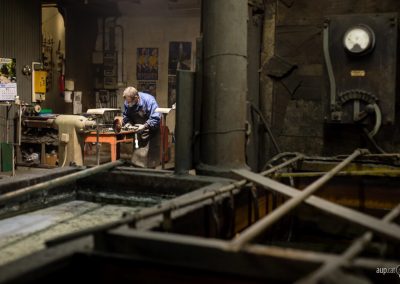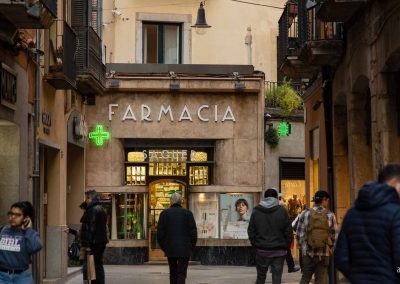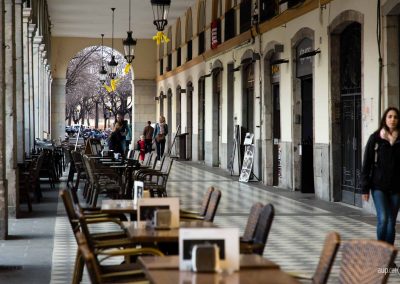P5: Farmàcia Saguer
Fith stop
Farmacia Saguer
Washing with soap and water is an everyday affair for us. With this simple gesture, substances and some microorganisms that are deposited on the skin and clothing and which can be dangerous for our health are eliminated.
If water also contains chlorine, virtually all of the pathogenic organisms present are eliminated. This property is due to the toxicity of chlorine. In large quantities chlorine is poisonous, even for humans, but the concentration in running water is very small, so that it is not dangerous for us, but is deadly for microorganisms.
There are many medications that can be found in this pharmacy, but there is no doubt that one of the most popular is aspirin. That is the commercial name of acetylsalicylic acid. This drug, which recently celebrated its 100-year anniversary, has analgesic (pain relief), antipyretic (fever reducer), anti-inflammatory, and anti-platelet properties. Although stomach problems can occur, recent research has revealed new properties, such as its role in preventing colon cancer.
Did you know?
The discovery of penicillin is attributed to Sir Alexander Fleming, but the Nobel Prize awarded to him in 1945 was shared with Sir Howard W. Florey and Dr. Ernst B. Chain.
When younger, E. Chain studied chemistry and got a doctorate in pathological chemistry. He did research in many fields related to biochemistry. It was the systematic study of antibacterial substances produced by microorganisms that led to his work with penicillin. He discovered its chemotherapeutic properties, work for which he was recognized with the Nobel Prize.
In the speech that Sir A. Fleming made when he received the Nobel Prize, he predicted that the day would come when penicillin could be bought in stores by everyone, and warned that improper use, self-medication, and administering insufficient doses would make bacteria resistant to its antibiotic action.
Farmàcia modernista
Farmàcia modernista situada als baixos d’un edifici d’habitatges al carrer de l’Argenteria. Es conserva bé l’interior projectat per l’arquitecte Masó, en canvi, la façana fou remodelada per Roca i Pinet el 1935, en estil Art Déco.
És, sens dubte, l’establiment públic més interessant de Girona, amb un interior revestit de ceràmica blanca i ferro forjat i fusta per a les prestatgeries i mobles, on s’hi conserven pots de medicaments de principis del s. XX. La façana estava també decorada amb revestiments ceràmics i elements de forja.
Sabó
El sabó s’obté per un senzill procés barrejant greixos, com l’oli, amb un àlcali, com la sosa càustica. És un producte sintètic molt antic: el van inventar els romans, o bé els babilonis ja fa 5000 anys, segons els historiadors.
El sabó té com a particularitat que les seves llargues molècules tenen una part que es dissol bé en aigua, mentre una altra que en fuig i prefereix els greixos. Com que la brutícia es compon en bona part de greixos, una part de la molècula de sabó s’unirà a la brutícia, mentre que l’altra seguirà amb l’aigua. El procés de rentat extraurà els greixos que passaran a l’aigua.
A més el sabó també té com a propietat que disminueix la tensió superficial, el que té com a conseqüència que les gotetes són més petites i que poden arribar a indrets més petits, com els porus de la pell.

Clor
El clor és un gas dens i tòxic que industrialment s’obté de la sal (NaCl). Té moltes aplicacions industrials, com la seva utilització com a blanquejant o en la fabricació del PVC (clorur de polivinil).

Àcid acetilsalicílic
L’ àcid acetilsalicílic és un fàrmac de la família dels salicilats, sovint emprat com a analgèsic (mals menors i dolor agut), antipirètic (contra la febre), antiinflamatori i anticoagulant.
Des de l’antiguitat, els medicaments contenien derivats de l’àcid salicílic, estructurament similars a l’Asprina. No va ser fins al 1853 que el químic francès Charles Frederic Gerhardt va preparar per primer cop l’àcid acetilsalicílic. Al 1897, la casa Bayer va començar a investigar amb l’àcid acetilsalicílic com a substituent menys irritant que els altres fàrmacs de la família dels salicilats. Al 1899, Bayer va anomenar a aquest fàrmac Asprina, comercialitzat amb molta popularitat arreu del món.
La síntesi de l’àcid acetil salicílic es basa en una reacció d’esterificació, en la qual l’alcohol de la molècula d’àcid salicílic reacciona amb anhídrid acètic, formant així l’Asprina i àcid acètic com a productes. En la síntesi també es pot usar àcid sulfúric com a catalitzador.



















